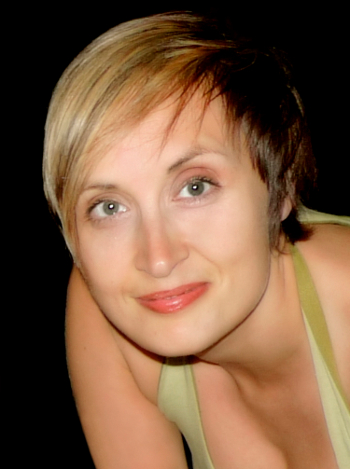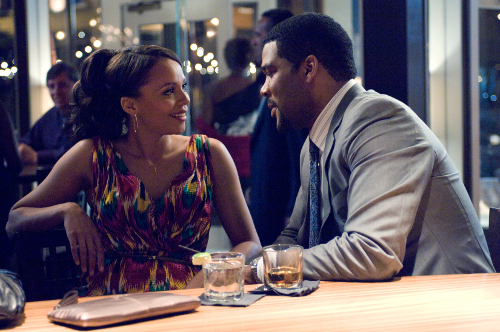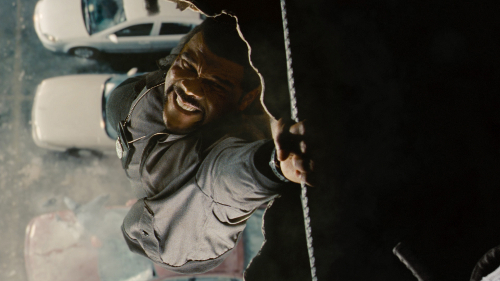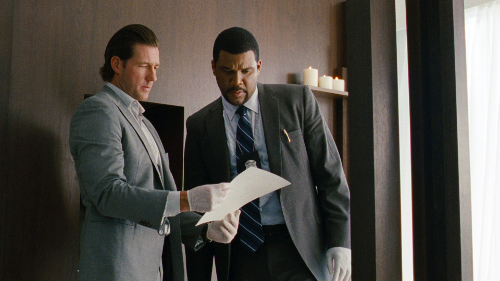
There is no movie without a script, and there is no script without a screenwriter. Certainly somebody has said this sort of thing before, but I'm saying it again. It's a vital position, demanding a complex personality. I speak with screenwriters. Some are cool and interesting and fun and smart. Happily, Kerry Williamson epitomizes these qualities -- plus she brings a few surprises.

Kerry Williamson
Alex Cross, which opens this week under the helm of Rob Cohen and features Tyler Perry as the eponymous detective, represents an early breakthrough in Ms. Williamson's bustling career (she's already working with Aronofsky, Payne, Kurtzman and Orci, and even la Jolie). We spoke, and I asked her about the process of adapting and relaunching James Patterson's massive series for the big screen.
'James read one of my spec scripts," reveals the Northern Irish scribe. 'It's called The Honeytrap, it's actually set in Belfast. And he really responded to it very positively, and asked if I would be interested in adapting Alex Cross. And as you can imagine, I was absolutely thrilled. I was a big fan of Patterson's, and I loved Morgan Freeman in the titular role.'

Cross in love!
'What I saw was an opportunity to reinvent the franchise,' she enthuses. 'What I really wanted to do was an origin story, and introduce the character to a new audience. I knew that it would invite comparisons to Morgan Freeman, and I kind of wanted to pull away from that.'
She notes a key plot-point and continues:
The book starts with Alex Cross working as a detective, with a young family. And then it jumps 10 years later, and he's already working as an FBI profiler. So what I wanted to do, which was a big departure, was to explore the period of time before he got into the FBI. The idea was to introduce him as a caring, principled, brilliant detective, a loving family man -- and when you need him, he's a force of intelligence and perception. But I didn't want him to be Sherlock Holmes right away. I wanted him to be someone who hasn't fully honed his skills. Not yet, anyway. And a guy who isn't afraid to use his muscle -- but only uses it when necessary, and warranted. And warranted, that's important, because he's a man whose character is built on this bedrock of strong moral convictions. That's the character you see with Morgan Freeman in older movies -- this very strong bedrock of integrity and moral convictions. What I wanted to explore is: Let's see that moral bedrock shattered. And let's see Alex Cross' ideals come into direct conflict with this innate and very visceral, animalistic desire to get vengeance.
Heh. That sounds like some of the other screenwriters I've met. I ask about working with Patterson and reconfiguring the book.
Aside from the major plot point (kind of a spoiler), pretty much everything is different; it's all original material. The characters are based very closely on the original characters from the book, with the exception of a couple of new characters that I added. There's one new character, Tommy Kane (Ed Burns onscreen), who's Alex's partner.
Ms. Williamson laughs.
He's actually based on my Uncle Tommy, who was quite a rascal. I introduce him to be, very loosely, Dr. Watson to Cross' Sherlock Holmes. And the villain (Matthew Fox, looking like Moby Gone Wild) is somewhat of a departure. Matt Fox brought a lot to that role.
Were Perry and Fox cast when she began?
They were yet to be cast. It was just me, writing the original adaptation of the book, working with Jim, just the two of us. It wasn't set up. It was almost like a passion project for us. It was a very good collaboration. He was very generous with his ideas and time. I'd work with him again in a second.

Cross in peril!
I ponder Ms. Williamson's apparent yen for writing not only male characters, but tough male characters. Did she sit around as a kid watching Dirty Harry?
She laughs heartily.
You know what? Dirty Harry is exactly right! It's funny you say that, because if I could do a remake of Dirty Harry, it would be my joy! That would be the ultimate! I'd love to do that, especially in today's world.
There you go.
Sometimes people say, 'Oh, you write these really tough, muscular characters' -- and very often those characters happen to be women. And all I can say is, I really, genuinely don't write through the prism of color or gender. I just try and write good characters. It's almost like you can write the characters and just add the names after the fact.

Burns & Perry investigate. Suck it, Law & Downey, Jr.
She tells a great story.
When I was a kid, in Ireland, everything closed pretty early. But on Thursday night they had late-night shopping in Belfast. My mum would always go out with her friends, and leave me with my dad. We didn't have a lot of channels on British TV; we certainly didn't have cable. I can't remember if it was the BBC or ITV, but every Thursday night, uninterrupted viewing, no commercial breaks, they played a movie. And my dad was just obsessed with '70s thrillers. I got to see them at a very young age -- way too young to be watching them.
She cites Dirty Harry plus the paranoid thrillers:
Three Days of the Condor, The Parallax View -- The Deer Hunter was one of my favorites of all time -- Day of the Jackal. I didn't see The Battle of Algiers back then, but these were movies that really informed my writing.
When my mum found this out, she was horrified, of course, and she told him I couldn't watch them anymore." (This bit wows me.) "I built myself a TARDIS -- like a Dr. Who TARDIS -- out of boxes, and I put a little mirror in it. I had a hole cut so I could look out, but if I looked out the hole, my dad could see me watching the TV. So I put the mirror in, so I could be in the TARDIS and watch the TV through the mirror. I'm not kidding, I was so young!" She cracks up. "But what's kind of odd to me today was that: the sound effects and the language -- I was in a cardboard box; I could hear it all!
Adding another layer, Ms. Williamson discusses growing up in the midst of the Troubles.
There's two sides to it. In one sense, I think it informs everything I do. It'll seem odd to say this, but the war -- to me as a child -- blown-up buildings and getting to play in the rubble and find cool things in the rubble. Or to go into the city and find it's cordoned off with steel gates, and army and police get on the buses, to check for bombs and explosives. Or you have to get on single-file, open your bags, raise your arms.
(Funny, it sounds like she's describing press screenings.)
I used to be so excited to stick my arms in the air, before the soldiers told me to do it. It was like a game. I think when you grow up in that, it becomes ordinary, it's a way of life.
It was only when I moved away and came back, that I noticed the constant drone of the helicopters, and the troops in the streets. I didn't need to be gone for very long, to come back and be startled by how pervasive the military presence was.
She cites her inclusive, nonpartisan, open-minded grandmother as an inspiration, how she'd let troops warm themselves in her home during bitter winters, little Ms. Williamson running past all their weapons lined up in the hall. "It's ordinary," she repeats, "and yet when you think of it, it's just appalling." When I ask what she thought of Paul Greengrass' early film about the Troubles, Bloody Sunday (its verité style formally inspired by The Battle of Algiers), she's not hesitant to opine: "Loved it. Love his work. I think he is an absolute genius. I would kill to work with Paul Greengrass." There you go.
Kerry's also a master of the segue.
One of the things I noticed, growing up in Belfast, is that sides aren't black and white; that's why I didn't want to make Alex Cross black and white, either. And that applies to people as well. In Belfast you'd see, in the worst atrocities, these little moments of humanity. No matter how despicable some of these terrorists, gangsters, corrupt police -- no matter how bad they were, you could see sometimes these little moments of unexpected humanity. And I really love to tell those stories, to write these characters. You can be surprised by some wonderful little things that these despicable characters can do. And vice-versa: someone who's honorable and moral could do something absolutely horrific. I kinda like contrasting the two.
Alex Cross opens Friday.
Film stills courtesy of Summit Entertainment.